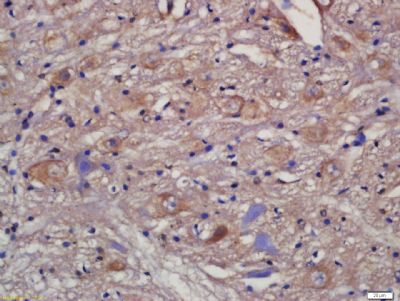产品货号 : mlR8719
英文名称 : LRP130/LRPPRC
中文名称 : 富含亮氨酸蛋白LRP130抗体
别 名 : LRPPRC; 130 kDa leucine-rich protein; GP130; Leucine-rich PPR-motif containing protein; LRP 130; LPPRC_HUMAN.
研究领域 : 细胞生物 免疫学 神经生物学 信号转导
抗体来源 : Rabbit
克隆类型 : Polyclonal
交叉反应 : Human, Mouse, Rat, Chicken, Horse, Rabbit,
产品应用 : ELISA=1:500-1000 IHC-P=1:400-800 IHC-F=1:400-800 ICC=1:100-500 IF=1:100-500 (石蜡切片需做抗原修复)
not yet tested in other applications.
optimal dilutions/concentrations should be determined by the end user.
分 子 量 : 152kDa
细胞定位 : 细胞核 细胞浆 细胞膜
性 状 : Lyophilized or Liquid
浓 度 : 1mg/ml
免 疫 原 : KLH conjugated synthetic peptide derived from human LRP130:165-270/1394
亚 型 : IgG
纯化方法 : affinity purified by Protein A
储 存 液 : 0.01M TBS(pH7.4) with 1% BSA, 0.03% Proclin300 and 50% Glycerol.
保存条件 : Store at -20 °C for one year. Avoid repeated freeze/thaw cycles. The lyophilized antibody is stable at room temperature for at least one month and for greater than a year when kept at -20°C. When reconstituted in sterile pH 7.4 0.01M PBS or diluent of antibody the antibody is stable for at least two weeks at 2-4 °C.
PubMed : PubMed
产品介绍 : Leucine-rich protein (LRP130) is a cytoplasmic mRNA-binding protein likely to be involved in the processing of mitochondrial DNA transcripts. Defects in the LRPPRC gene that encodes LRP130 result in the French-Canadian type of Leigh syndrome, a severe neurological disorder characterized by lesions in the subcortical region of the brain. LRP130 also interacts with the low-affinity receptor for leukemia inhibitory factor to produce an intracelluar signal cascade.
Function:
LPPRC is thought to play a role in RNA metabolism in both nuclei and mitochondria. In the nucleus, LPPRC binds to HNRPA1-associated poly(A) mRNAs and is part of nmRNP complexes at late stages of mRNA maturation, which are possibly associated with nuclear mRNA export. In mitochondria, LPPRC binds to poly(A) mRNA. LPPRC may play a role in translation or stability of mitochondrially encoded cytochrome c oxidase (COX) subunits. Defects in LRPPRC are the cause of Leigh syndrome French-Canadian type (LSFC). Leigh syndrome is a severe neurological disorder characterized by bilaterally symmetrical necrotic lesions in subcortical brain regions that is commonly associated with systemic cytochrome c oxidase (COX) deficiency. In the Saguenay-Lac Saint Jean region of Quebec province in Canada, a biochemically distinct form of Leigh syndrome with COX deficiency has been described. Patients have been observed to have a developmental delay, hypotonia, mild facial dysmorphism, chronic well-compensated metabolic acidosis, and high mortality due to episodes of severe acidosis and coma. Enzyme activity was close to normal in kidney and heart, 50% of normal in fibroblasts and skeletal muscle, and nearly absent in brain and liver.
Subunit:
Interacts with INPP5D/SHIP1 (By similarity). Forms heterodimers composed of LIPR and IL6ST (type I OSM receptor). Also forms heterodimers composed of OSMR and IL6ST (type II OSM receptor). Homodimer. The homodimer binds two molecules of herpes virus IL6. Component of a hexamer of two molecules each of IL6, IL6R and IL6ST. Interacts with HCK.
Subcellular Location:
Mitochondrion. Nucleus; nucleoplasm. Nucleus inner membrane. Nucleus outer membrane. Note: Seems to be predominantly mitochondrial.
Tissue Specificity:
Found in all the tissues and cell lines examined. Expression not restricted to IL6 responsive cells.
DISEASE:
Defects in LRPPRC are the cause of Leigh syndrome French-Canadian type (LSFC) [MIM:220111]. Leigh syndrome is a severe neurological disorder characterized by bilaterally symmetrical necrotic lesions in subcortical brain regions that is commonly associated with systemic cytochrome c oxidase (COX) deficiency. In the Saguenay-Lac Saint Jean region of Quebec province in Canada, a biochemically distinct form of Leigh syndrome with COX deficiency has been described. Patients have been observed to have a developmental delay, hypotonia, mild facial dysmorphism, chronic well-compensated metabolic acidosis, and high mortality due to episodes of severe acidosis and coma. Enzyme activity was close to normal in kidney and heart, 50% of normal in fibroblasts and skeletal muscle, and nearly absent in brain and liver. LSFC patients show reduced (<30%) levels of LRPPRC in both fibroblast and liver mitochondria and a specifically reduced translation of COX subunits MT-CO1/COXI and MT-CO3 (COXIII).
Similarity:
Contains 20 PPR (pentatricopeptide) repeats.
SWISS:
P42704
Gene ID:
10128
Important Note:
This product as supplied is intended for research use only, not for use in human, therapeutic or diagnostic applications.
产品图片












